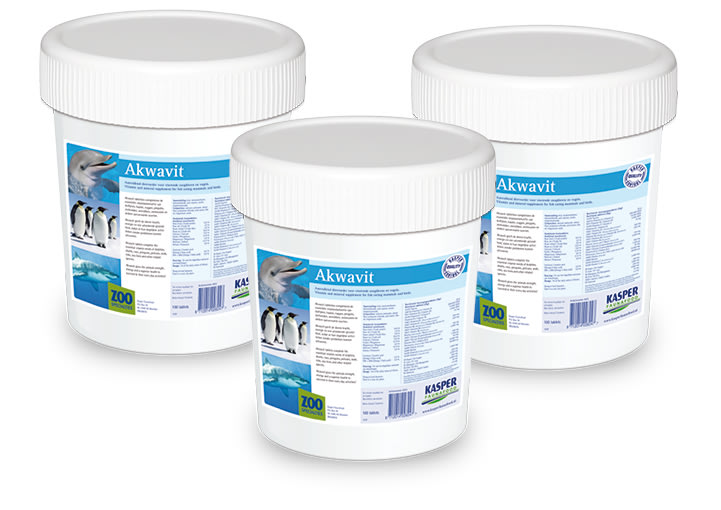
ZOO Specialties Akwavit
Recommended daily feed intake
In many zoos and marine aquariums, the daily portion of fish fed to fish-eating animals was first frozen. In fish that were frozen and then thawed, enzymes and oxidants that were active are associated with the breakdown of dead animals. As a result, the effectiveness of some of the supply of vitamins in the fish is lost. This can be easily compensated for and specifically addressed by adding Akwavit tablets behind the gills or in the mouth of the fish used to feed the animals.
ZOO Specialties Akwavit
Akwavit Fish eating animals
Complementary feed especially developed for various fish eating animals such as penguins, ibises and pelicans.
Akwavit Fish-eating Animals contains all the necessary vitamins and minerals in the proper proportions. Akwavot fish eating Animals contains a limited amount of vitamin A and in addition beta-carotene as pro-vitain A. Beta-carotene is converted into vitamin A as the animal requires. High levels of thiamine helps in prevent thiamine deficiency. This is particularly important when feeding the animals dead fish, as decomposition enzymes are present that specifically target thiamine. Thiamine must be provided in the feed every day, as it compensates for any lack of vitamin and so prevents any attack on the central nervous system.
Contains all necessary vitamins and minerals in a balanced ratio
Contains Beta-Carotene as a precursor to Vitamin A
Contains Thiamin
200 tb.
Akwavit Dolphins
Complementary feed developed for dolphins. It contains a balanced level of vitamins and minerals. Research has shown that the level of vitamin A in the blood naturally is lower in the wild than in captivity. Therefore Akwavit Dolphins contains beta-carotene as a precursor of vitamin A. Only when vitamin A is needed, it will be converted into vitamin A. Thiamine (vitamin B1) is likewise sufficient for lactating dolphins. It contains magnesium, needed for developing healthy bones and to play its role in the muscular system and in the nervous system.
Tablets specially developed for dolphins
Contains all necessary vitamins and minerals in a balanced ratio
Contains Beta-Carotene as a precursor to Vitamin A
Contains Thiamin
Akwavit Pinnipeds
Complementary feed especially developed for pinnepeds, such as seals, robs, sea lions and walruses. Akwavit Pinnipeds contains a balanced level of vitamins and minerals along with natural antioxidants. It contains beta-carotene as a precursor of vitamin A. That can be converted into vitamin A as the animal requires it. A high thiamine (vitamin B1) content helps in preventing thiamine deficiency.
Furthermore Akwavit Pinnipeds contains various natural antioxidants like grape seed extract, lutein, zeaxanthin and alpha lipoic acids. These antioxidants are linked to various health aspects for pinnipeds and contribute towards making vitamin C and E more effective.
Actual health aspects are:
UV-induced damage to lens and skin
Support to wound-healing processes and protection against adverse reactions to infection.
Reduction in physical complaints due to the ageing process
Contains various antioxidants such as grape seed extract, lutein, zeaxanthin and alpha lipoic acids
Akwavit Shark and Shark Mini
Complementary feed especially developed for elasmobranch fish-types such as sharks and rays. It contains a balanced level of vitamin and minerals. Akwavit Shark contains a high amount of iodine and vitamin C as well as chalk weed: a natural source of minerals that ensures the presence of an easily absorbable form of calcium. Akwavit Shark contains only limited amounts of vitamin A as well as beta-carotene. Beta-carotin is transformed into vitamin A if the animal requires it.
Available in:
Akwavit Shark: oval 23 mm, 2 g per tablet (Article number: 691506)
Akwavit Shark Mini: round 6 mm, 100 mg per tablet (Article number: 691706)
Akwavit Basic Liquid
Feed supplement for fish-eating animals. Contains vitamin E as antioxidant to enhance resistance and health. Contains thiamine vitamin B1 to prevent thiamine deficiency. This is particularly important when feeding the animals dead fish, as decomposition enzymes are present that specifically target thiamine. Thiamine should be provided daily in the feed to prevent any shortfall and any subsequent attack on the central nervous system.
Download the composition here
Recommended daily feed intake
In many zoos and marine aquariums, the daily portion of fish fed to fish-eating animals was first frozen. In fish that were frozen and then thawed, enzymes and oxidants that were active are associated with the breakdown of dead animals. As a result, the effectiveness of some of the supply of vitamins in the fish is lost. This can be easily compensated for and specifically addressed by adding Akwavit tablets behind the gills or in the mouth of the fish used to feed the animals.
